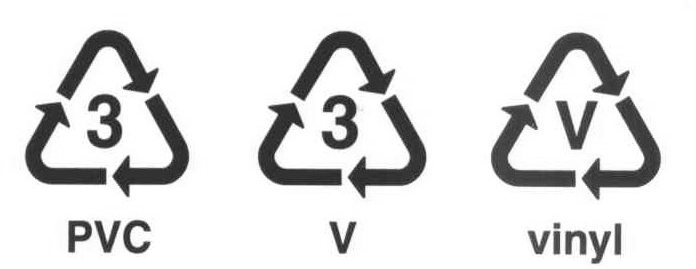Bisphenol A has been monitored in the long term particularly in tins in the Czech Republic, whereas plastic packaging has been neglected, or, at least, results of its analyses are not available to the public. "Because of that, we ordered an analysis of 21 pieces of packaging made of PVC (1) for presence of bisphenol A (2) in the ITC laboratory in Zlín. Releases of bisphenol A into the foodstuffs were proved in the case of three of them" said the head of the Toxics Free Future campaign of the Arnika Association, RNDr. Jindřich Petrlík.
In spite of the fact that the found out values of bisphenol A migration did not exceed the allowed limit, the measurement proved the yet little known fact that this substance is present also in packaging made of PVC. Thus, it revealed another problem connected with use of packaging made of this plastic, from which also other substances - for example, adipates (3) - may be released into foodstuffs in addition to bisphenol A. "By coincidence, all the three foodstuff samples packaged in PVC-packaging in this case of which releases of bisphenol A into foodstuffs took place, originated from the network of Albert stores. Thus, in our opinion, there is one more reason for Ahold to speed up stopping the use of PVC packaging in its stores," stated Petrlík during today's press conference. "Environmental protection forms part of responsible strategy of our company. Also because of that, we welcome cooperation with the Arnika Association in the field of the materials used for packaging. Red meat packaging of our own brand was already replaced by non-PVC alternatives. Recently, we have carried out a pilot test of manually used films, and, on the basis of positive results, dual operation has been started, which means that we will gradually introduce non-PVC alternatives," said Mgr. Petr Chadraba, manager of responsible project communication of the brands Albert and Hypernova, in reaction to the published results of the analyses.
Most often, people are exposed to negative influence of bisphenol A (BPA) through consuming foodstuffs packaged or prepared in plastics comprised of this substance (polycarbonates, PVC). Since the 1930s, BPA is known as an endocrine disrupting chemical (EDC), and in the last ten years, its impacts have been linked to surprising number of diseases. More and more scientific studies include bisphenol A among causes of diseases and disorders such as infertility, obesity, breast and prostate cancers, diabetes, incorrect thyroid gland function, and even attention deficit disorder. All these disorders were observed even in the cases when the individuals were exposed to a very low amount of bisphenol A (not reaching the dose used in standard toxicology). In addition to foodstuffs, a source of its releases into the environment may be, for example, also epoxide resin manufacturing. In the
Today, Arnika issued a translation of Friends of the Earth study concerning bisphenol A, entitled "Blissful Ignorance of Bisphenol A", with a postscript on the situation in the Czech Republic (see annex to this press release).
Notes and annexes:
(1) A PVC packaging is marked with a triangle recycling mark with the number "3" or letter "v". Under the triangle, there is a legend "PVC", "V" or "vinyl". This mark is usually stamped on the bottom side of the plastic product, or on paper label.
(2) Summary table of the results of packaging analyses for bisphenol A releases into foodstuffs
| Foodstuff | Manufacturer | Seller | Plastic | BPA migration into foodstuffs in mg/kg |
| Cream horns Babické trubičky | Šetra, s.r.o. | Tesco | PVC | <0.06 |
| Broccoli | Ahold | Albert | PVC | < 0.06 |
| Celery B.V. | Ahold | Albert | PVC | 0.09 - 0.17 |
| Sausage Čabajská klobása | Ahold | Albert | PVC | 0.32 |
| Chicken drawn without giblets | Kostelecké uzeniny, a.s. | Penny Market | PVC | < 0.06 |
| Chicken drawn without giblets | Kostelecké uzeniny, a.s. | Tesco | PVC | < 0.06 |
| Chicken upper thigh | Drůbežářské závody, Klatovy | Penny Market | PVC | < 0.06 |
| Chicken breast slice | Vzdora, s.r.o. | Penny Market | PVC | < 0.06 |
| Chicken breast slices | Agropol Food, a.s. | Albert | PVC | < 0.06 |
| Chicken breast slices | Kostelecké uzeniny, a.s. | Tesco | PVC | < 0.06 |
| Chicken lower thigh | Drůbežářské závody, Klatovy | Albert | PVC | < 0.06 |
| Chicken thigh slice Flamengo* | Agropol Food, a.s. | Albert | PET | < 0.06 |
| Chicken thigh slices Vodňanské kuře | Agropol Food, a.s. | Plus | PVC | < 0.06 |
| Chicken skewer with bacon | Jihočeská drůbež Vodňany, a,s. | Albert | PVC | < 0.06 |
| Yeast dumpling - blueberry | POL, s.r.o. | Plus | PVC | < 0.06 |
| Apricot yeast dumplings | Pekosa Chodov, s.r.o. | Penny Market | PVC | < 0.06 |
| Chives spread | Lahůdky u Cábů | Trefa Market | PVC | < 0.06 |
| Raisins | Olga Myslivečková | Phoung Thai Thi, | PVC | < 0.06 |
| Mixed soup vegetables | Čerozfrucht, s.r.o. | Penny Market | PVC | < 0.06 |
| Cheese Zlatá Niva | Ahold | Albert | PVC | 0.18 |
| Wieners with cheese | Ahold | Albert | PVC | < 0.06 |
| Castle delicious potatoes | Družstvo Bramko CZ, Semice, | Albert | PVC | < 0.06 |
* this foodstuff was in a PET cup.
(3) Adipates - for example, DEHA – di (2-ethylhexyl)adipate – are used as a PVC plasticizer. Most often, it is added into foodstuff packaging made of PVC. A number of uncertainties still exist concerning DEHA effects on human health, because all studies were carried out in laboratory conditions only, and no research was carried out directly with human subjects. As releases of relatively high amount of this substance from the packaging into foodstuffs were observed, the precautionary principle should be applied. DEHA may cause changes in liver cells, damage fetuses, and cause developmental changes.
Annex: Bisphenol A in the environment in the
After reading this study, the readers from the
In 2004, bisphenol A production was restarted in chemical plant Spolchemie in
Within the framework of the process of integrated permit issuance for this installation in 2006, Arnika pointed out, among other things, that there is a risk of bisphenol A releases. Because of that, it "won" information on the commission of a crime filed by Spolchemie. The Police of the
Table No. 4: Bisphenol A amount placed on the market in the
| Year | 2000 | 2001 | 2002 | 2003 | 2004 | 2005 | 2006 |
| BPA amount in tons | 552 | 1 508 | 905 | 66 | - | - | 620 |
In data available to the public, there is hardly possible to find any data on BPA monitoring in the environment. An exception is the Report on the State of Water Protection in the Czech Republic in 2006, stating that bisphenol A concentrations were considerable in the river Vltava downstream of Ceske Budejovice, in lower concentrations also downstream of Prague.
Foodstuff packaging
In the case of meat and fish products (in metal packaging), bisphenol A and bisphenol A diglycidyl ether presence has been monitored for several years already. Bisphenol A diglycidyl ether (BADGE) and its derivatives are released into foodstuffs from varnishes used for coating the inner sides of the tin surface. The analyses are ordered and published regularly by the Czech Agriculture and Food Inspection Authority (CAFIA). The found out results, with the exception of one case, did not prove exceeding of the European standard of 1 mg/kg since 2002, however, presence of BADGE or some of its derivatives in tins was found out every times. Results of the analyses are summarised in Table No. 5. In 2002, the above-mentioned limit was exceeded by a sample of smoked salmon paste, containing 1178 μg/kg-1 BADGE.
Table No. 5: Results of bisphenol A diglycidyl ether and its derivatives monitoring (expressed as bisphenol A in the CAFIA summary) in meat and fish tins in the period 2002 - 2007. Source: Reports on the results of planned checking of foreign substances in foodstuffs, available from the CAFIA pages - www.szpi.gov.cz
| Year | 2002 | 2003 | 2004 | 2005 | 2006 | 2007 |
| Number of samples | 28 | 28 | 28 | 14 | 14 | 7 |
| Positive for BACTE | 22 | 23 | 22 | 12 | 10 | 7 |
| Concentration range - positive samples (in µg/kg) |
36.4 - 1178 |
7.3 - 462 |
7.7 - 391.6 |
5 - 270 |
23 - 96 |
11 - 581 |
| Limit in µg/kg | 1000 | 1000 | 1000 | 1000 | 1000 | 1000 |
In spite of the fact that bisphenol A is used also as an additive into plastic foodstuff packaging, state institutions have not carried out checking of its migration into foodstuffs yet, according to the available data. Because of that, Arnika ordered analyses of more than twenty samples of foodstuff packaging made of PVC in the end of 2008. Of the 21 tested packaging samples, the analyses proved migration of bisphenol A into foodstuffs in three cases in the range of 0.09 - 0.32 mg/kg of foodstuff simulant. [2] Although the simulation migration limit set out by the Decree of the Ministry of Health of the Czech Republic No. 271/2008 Coll. at the level of 0.6 mg/kg was not exceeded in either of the cases, the carried out tests proved that packaging made of PVC, from which bisphenol A may be released into foodstuffs, is present also in the Czech market.






